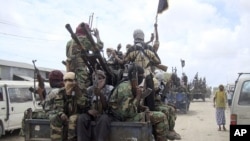United Nations officials have condemned Somalia's al-Shabab insurgents for raiding the offices of several humanitarian agencies on Monday and banning their activities. The developments come as the Islamic rebels face mounting military opposition.
U.N. Secretary-General Ban Ki-moon condemned al-Shabab's seizure of property and equipment belonging to aid groups and U.N. agencies in central and southern Somalia, calling the attacks "brazen."
U.N. Under-Secretary-General for Humanitarian Affairs Valerie Amos warned that famine could return to some drought affected areas, if relief work is interrupted.
Both officials also condemned an order by al-Shabab insurgents to ban 16 international aid agencies from operating in areas under their control.
Spokesmen for al-Shabab accuse the aid agencies of political bias, misconduct and illicit activities. They also say the agencies had not been doing useful work, but that other groups, including the International Committee of the Red Cross and the medical aid group Doctors Without Borders, would still be allowed to operate.
Earlier this month, U.N. officials said famine conditions no longer exist in three of the areas that were worst affected, all of them under al-Shabab control, as the Horn of Africa faces its worst drought in 60 years.
J. Peter Pham, Africa director for the Atlantic Council research center here in Washington, says the al-Qaida-linked al-Shabab is facing increasing military pressure -- from African peacekeepers, known as AMISOM, to reported U.S. drone strikes and attacks from the armies of neighboring countries.
"The famine and [al-]Shabab's contributions to its exacerbation really cost [al-]Shabab a great deal of popular legitimacy. The AMISOM forces in Mogadishu in the last year have been really enhanced in their capabilities and have certainly been successful in pushing [al-]Shabab out of the capital militarily. And [al-]Shabab is under pressure from the Kenyan incursion, even if the Kenyans are apparently bogged down," he said.
Ethiopian troops are pushing ahead with a western front against al-Shabab fighters as well.
Pham cautions that even if al-Shabab fighters are further weakened, their core elements might move away from controlling territory to planning more terrorist attacks. He warns that a multitude of competing militia and clan-based warlords might reemerge. "I think there is an opportunity to militarily degrade [al-]Shabab, but I worry about whether the subsequent follow up is going to be there," he said.
In their statements, U.N. officials placed hopes on civil society meetings taking place in the Somali capital Mogadishu to establish a framework to replace the country's Transitional Federal Government and usher in stability and effective governance. In other parts of Mogadishu, witnesses say several explosions on Sunday and Monday killed at least six people. Al-Shabab fighters left most of their fixed positions in the capital in August, but have continued suicide bombings and guerrilla attacks.
Somalia has not had an effective central government for more than 20 years.
UN Condemns al-Shabab Raids and Humanitarian Aid Ban




